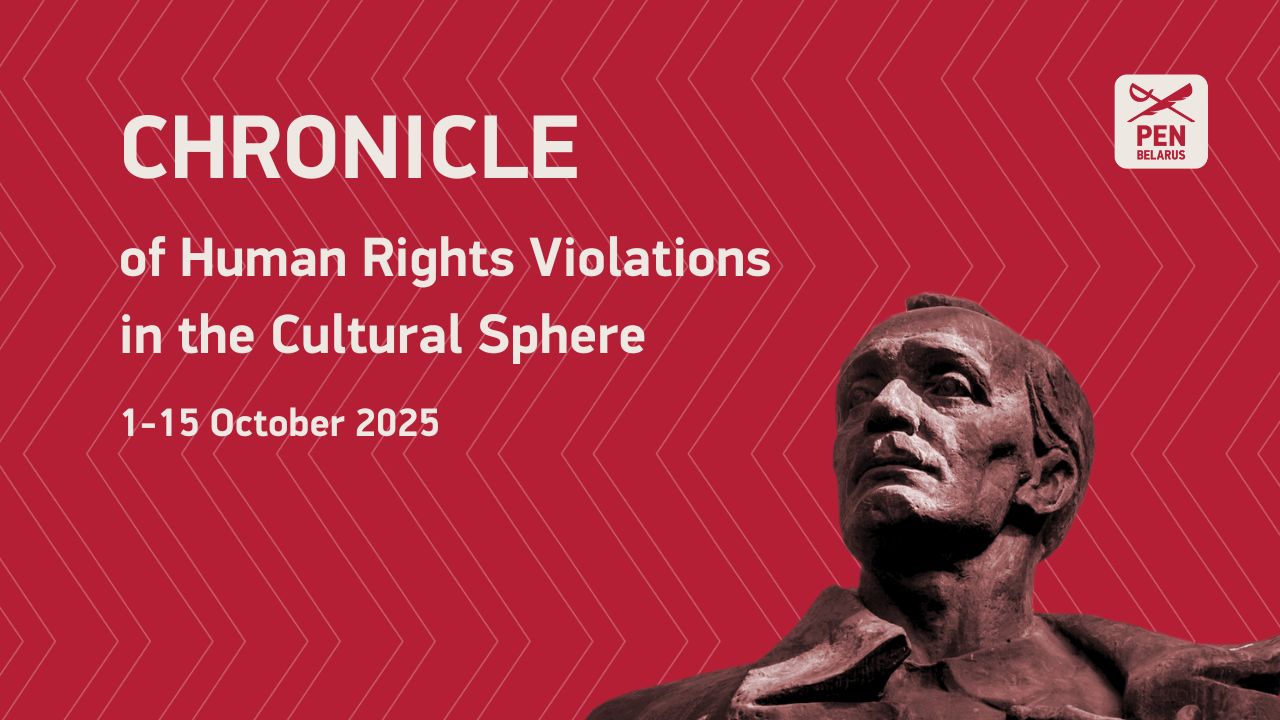
As of 15 October 2025, at least 153 cultural figures, including 33 writers, were not free – either imprisoned or in home confinement.
Local historian Jaŭhien Staravojtaŭ was convicted in a politically motivated criminal case.
Former political prisoner and Belarusian linguist, Natalla Dulina, a specialist in Italian language studies, described being tortured by cold while in prison.
Political prisoner, journalist and essayist Andrzej Poczobut is reported to be experiencing serious health problems.
Former political prisoner Maksim Viniarski revealed that he was persecuted in prison for writing poetry.
Social media pages of the music group Naviband were declared “extremist”.
A court in Belarus ruled that the social media pages of Bel.Read, a project promoting Belarusian-language audiobooks, are “extremist materials”.
I. Criminal prosecution of cultural figures, authors, and performers
On 12 October, it became known that local historian and creator of the video blog “Mahiloŭ Chronicles” Jaŭhien Staravojtaŭ was convicted by the Mahiloŭ Regional Court under Parts 1 and 2 of Article 361-4 of the Criminal Code and sentenced to home confinement.
Jaŭhien Staravojtaŭ was arrested in May 2025 and held in a pre-trial detention centre for more than three months. On 3 October 2025, he was added to the official list of Belarusian citizens, foreign nationals and stateless persons allegedly involved in “extremist activities”.
Staravojtaŭ graduated from the Faculty of History of Mahiloŭ State University, specialising in Iron Age archaeology in Belarus, and previously worked at the Kličaŭ Local History Museum.
II. Loss of health in places of incarceration
On 1 October, Anžalika Borys, Chair of the unofficial Union of Poles in Belarus, reported that political prisoner, journalist and essayist Andrzej Poczobut is suffering from serious health problems, including hypertension and arrhythmia.
III. Persecution for literary activity in places of incarceration
Former political prisoner Maksim Viniarski, who was released and expelled from Belarus on 11 September, said on 2 October that he had been persecuted in the penal colony for writing poetry:
“I was transferred to a cell-type facility so that I would have less contact and interaction with other people. So that I would not “infect them with extremism”, I would not show that one can speak and write the truth, nor demonstrate a political stance. One possible reason was that I wrote poems, and their content displeased the prison administration.
The cell-type facility, in essence, differs from a punishment isolation cell only in that it has bedding (issued for the night), books, and the theoretical possibility to send and receive letters. In all other respects, it is the same as a solitary confinement cell: a sealed window, no natural light, no fresh air or space.”
IV. Tortures in places of incarceration
Former political prisoner Natalla Dulina, a Belarusian linguist and specialist in Italian language studies, described being tortured by cold:
“The most difficult thing for me was the punishment isolation cell. It was truly torture, even though it wasn’t the first time I had been held in such conditions. Mikoła Dziadok [former political prisoner, writer and anarchist activist] said that grown men howled from the cold. Our girls didn’t howl, but they also complained about how freezing it was. I had already gone through something like this once, during administrative detention. They put me and another political prisoner in an icy cell. Then, as in the punishment isolation cell in the colony, they took away all our warm outer clothes. The cold was unbearable – it was impossible to stand still. I ran, jumped, and did physical exercises just to stop the suffering from the cold. In the punishment isolation cell, everything was according to schedule: three meals a day, eight hours of sleep. But forgive me – what kind of sleep can there be when you are shivering from the cold?”
V. Repression in the music sphere
On 9 October, the Dokšycy District Court designated the social media pages of the music band Naviband as “extremist”. The ruling covered the Facebook page “Naviband – Belarus”, as well as the Instagram accounts “naviband” and “ksunaviband”.
VІ. Repression in the book sector
On 9 October, the Čyhunačny District Court of Viciebsk declared the social media pages of the Belarusian-language audiobook enthusiasts’ project Bel.Read to be “extremist”. The ruling covered the project’s accounts on TikTok, Instagram, and YouTube.
VII. Russification in libraries
On 14 October, it became known that the state enterprise “Network of Public Libraries of the City of Homiel” allocated more than 16,500 Belarusian roubles for the purchase of new books. The procurement list includes over 1,000 titles in Russian, while no Belarusian-language books are included. A similar situation has been observed in other cities. In Rahačoŭ, in the spring of 2025, all 3,475 new books acquired for the library named after the classic of Belarusian literature Uładzimir Karatkievič were also in Russian.
VIII. Banned books
On 6 October, it was reported that the Prosecutor of Minsk’s Saviecki District issued formal orders to the owners of two online marketplaces, demanding that they remove “prohibited printed publications” from their listings.
During monitoring of e-commerce platforms, the prosecutor’s office identified books included in the official “List of Printed Publications Containing Information and/or Materials Whose Distribution May Harm the National Interests of the Republic of Belarus”.
Among the banned titles were the novels Summer in a Pioneer Tie and What the Swallow Is Silent About by Elena Malisova and Katerina Silvanova, as well as The Corrupted King and The Steel Princess by Rina Kent, and Hunting Adeline by H. D. Carlton.
